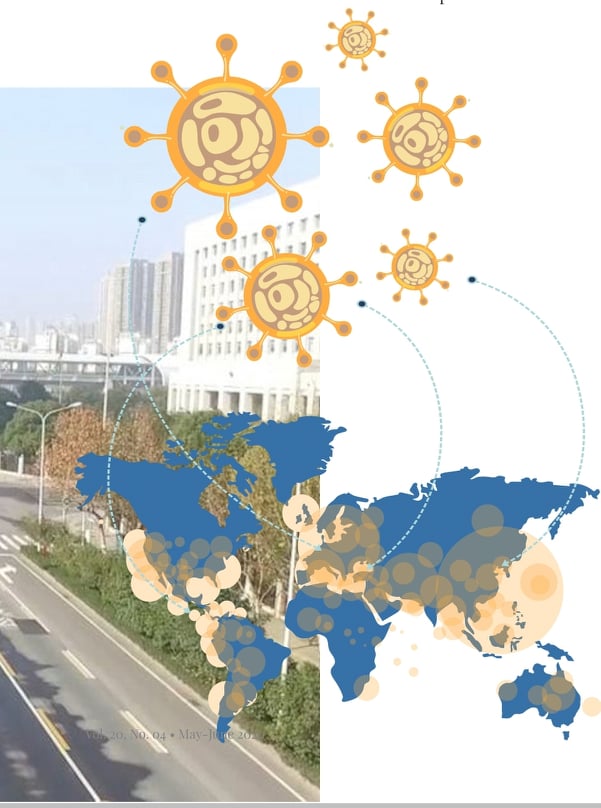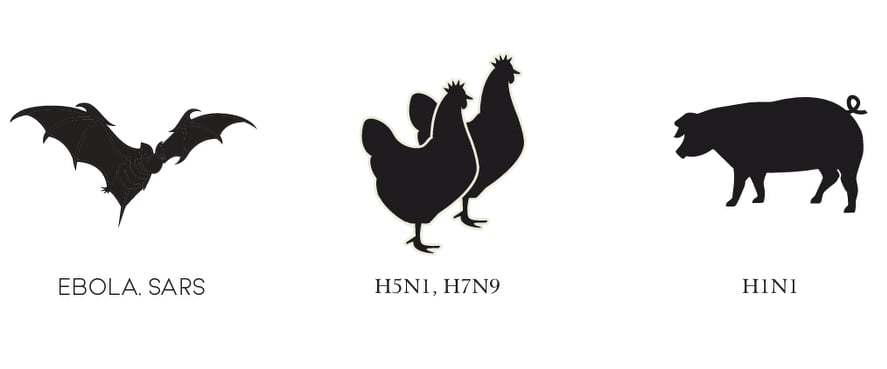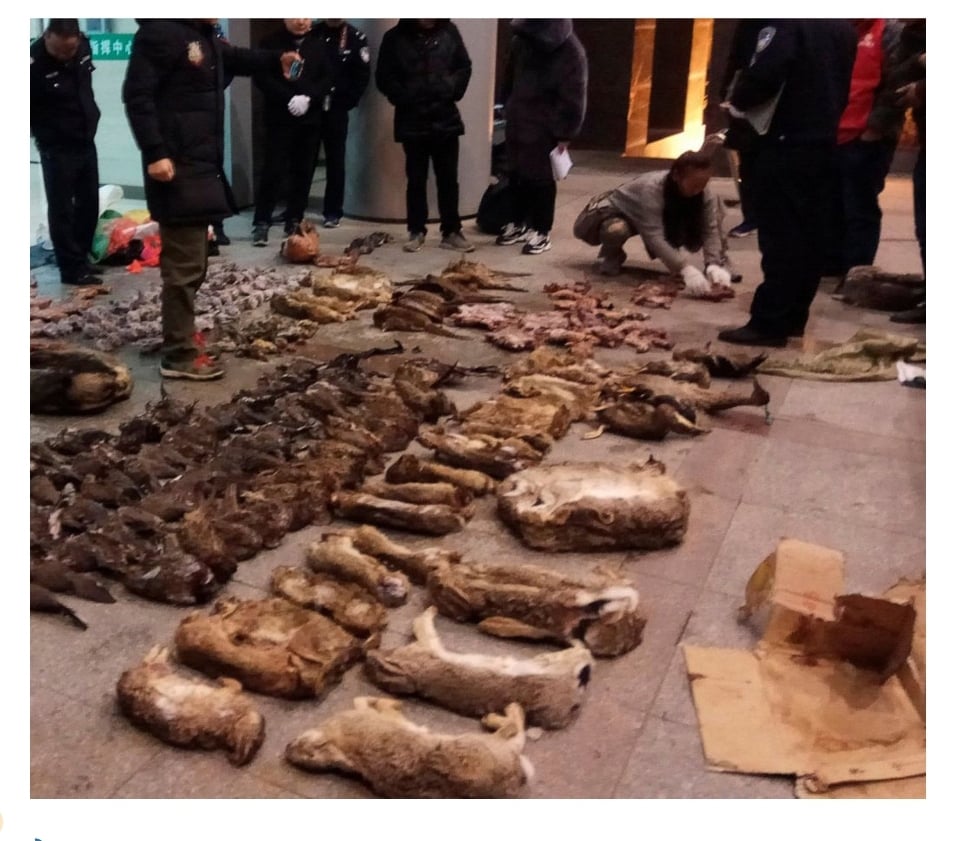Wuhan, the city with a live animal market where the new coronavirus Covid-19 originated, has opened outdoor markets three months after the outbreak. This time, the market isn’t open for animal meat – just fresh produce.
A global crisis
Most of us haven’t experienced a global crisis like COVID-19 before:
Citywide lockdowns, mandatory quarantines, large-scale closing of businesses, extensive layoffs, rationing of supplies, markets frightfully crashing, political tension, border shutdowns, and hospitals overwhelmingly overflowing that they make the difficult decision every day of turning away sick people – even if it means the latter will die.
Forecasts predict that the pandemic’s impact on our lives and economy will stretch longer than the virus itself.
Chaos.
Would you believe that this global chaos is brought upon us by one thing that most people do on a daily basis and until now during the pandemic? In case you’re wondering what that is, it’s the consumption of animals.

Coronavirus and animal consumption
Coronavirus ground zero is a wet market in Wuhan where animals, both dead and alive, wildlife and not, are sold in the open, according to a 2020 article by Sarah Newey and Ann Gulland for Telegraph.
Scientists are divided on the source, whether it’s the needless consumption of bats or that of pangolins, but the consensus is clear: This large-scale disruption is brought on by our abuse of animals.
Wuhan market: Ground zero
Wuhan is a port city in the Hubei province in China. The infamous wet market in the city sold the common fare of animal flesh and sea animals, and was also known for its live animal market and wildlife meat trade.
Horrendous living conditions of the live animals in the market were documented: animals cramped in filthy cages regularly witnessed the killing of other animals right in front of them until it was their time to be butchered.
This market, where the first cased of COVID-19 were documented, was immediately shut down after China alerted the World Health Organization (WHO) of unusual pneumonia cases in Wuhan.
The whole city was also placed under a strict lockdown.
Since January 1, the live animal market has been closed, as reported in an All Jazeera article. But in February, outdoor markets selling fresh produce started opening again in the city, bringing a sense of normalcy and fresh, healthy food to the residents, according to Columbia Basin Herald.
Is this only temporary change in a small city, or is this the start of a global consciousness shift?
Wuhan market, three months later

The market selling sea creatures and animal meat has been closed. Instead, Wuhan now has 14 outdoor fresh markets that sell fruits and vegetables, according to Dai Paioyi’s online report for CGTN. These markets are thoroughly disinfected at the end of every business day.
There aren’t many customers yet as most residents still fear the pandemic, and rightly so. But now, vegetable vendors have a source of livelihood again, the city has a sense of normalcy coming back, and the residents’ food choices have become healthier for them, the animals, and the environment – at least for the time being.
Vegetables: A necessity in China during COVID-19 outbreak
China has told farmers to ramp up their fresh produce productions amidst the COVID-19 outbreak.
The demand for vegetables has gone up so much that the country’s biggest vegetable production base, Shouguang, has been asked to deliver 600 tons of fresh vegetables to Wuhan everyday, based on a recent Reuters report published in the New York Post.
And while markets with dead animals are still closed in Wuhan, Wuhan fruit and vegetable markets are operational.
Outbreaks are quickly forgotten
It’s nothing new for an outbreak to be linked to human’s consumption of animal meat, according to a 2020 report by Alia Chughtai for Al Jazeera.

Ebola and SARS are linked to bats. H5N1-bird flu, with a 53% fatality rate, is linked to birds. H7N9, another bird flu, has a fatality rate of 39%. H1N1, also called swine flu, is linked to pigs.
But outbreaks seem to be forgettable. Our species continues to eat, wear, and use animals.
COVID-19 has and will continue to cause deaths, hunger, poverty, and instability. If we forget once again how horrendous treatment of animals has time and time again brought us illnesses and suffering, then we’ll just have to prepare for another outbreak.
A ban on wildlife trade

The global virus outbreak has the world demanding, Stop the wildlife trade for good.
The trade removes wildlife from their homes, or breeds them in unnatural and horrific conditions – merely for humans to have prisoners for pets, meaningless trophies, unreliable traditional medicine, cruel decorations, and unnecessary food. The size of this trade in China is unclear because many operations are undocumented.
Feeling the pressure to end the cruel and dangerous industry, the Chinese government issued a temporary ban on wildlife trade. On February 24, the country’s government declared an immediate and comprehensive ban on wildlife trade and consumption, according to a 2020 article by Natasha Daly for National Geographic. But the world demands for and deserves more.
This is progress, but we aren’t even close to protecting ourselves.
A healthier, safer, more compassionate future
The global sentiment is right: We shouldn’t consume wildlife.
Should we be consuming any animal at all?
A diet heavy in animal products – meat, dairy, and eggs – has been found to be the primary cause of the world’s top two killers: heart disease and stroke. WHO’s 2018 data shows that both diseases killed a combined total of 15.2 million people in 2016. That’s 41,530 deaths every day.
The total reported deaths from COVID-19: 24,087 in three months, or under 300 deaths per day, according to WorldOMeters.info.
It’s no coincidence that when we’re older, we’re advised to eat more plants than animal products, or that the ground zero of COVID-19 had to rely on fruits and vegetables to survive the deadly virus.
Animal products have and will continue to put our lives and way of living at serious risk. We’ll continue experiencing deadly outbreaks and suffering from life-threatening illnesses until we stop our consumption of any animal product.
Animals are feeling beings who are a part of our natural world; they belong on this earth just as much as we do. Let’s allow them to live their natural lives, and we’ll get on with ours without deadly outbreaks and killer lifestyle diseases looming above our heads.
This appeared in Animal Scene magazine’s May-June 2020 issue.
You might want to read:
– Spread of zoonotic diseases comes from illegal wildlife trade in Southeast Asia
– From animal to man: Zoonosis and how to prevent animal-borne diseases
– Wildlife diseases you didn’t know existed






